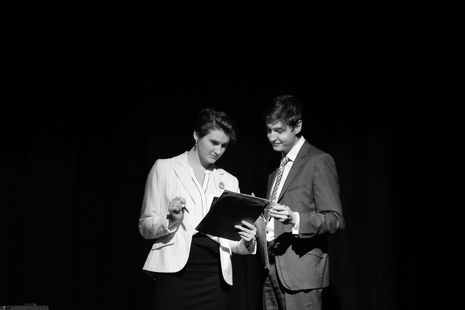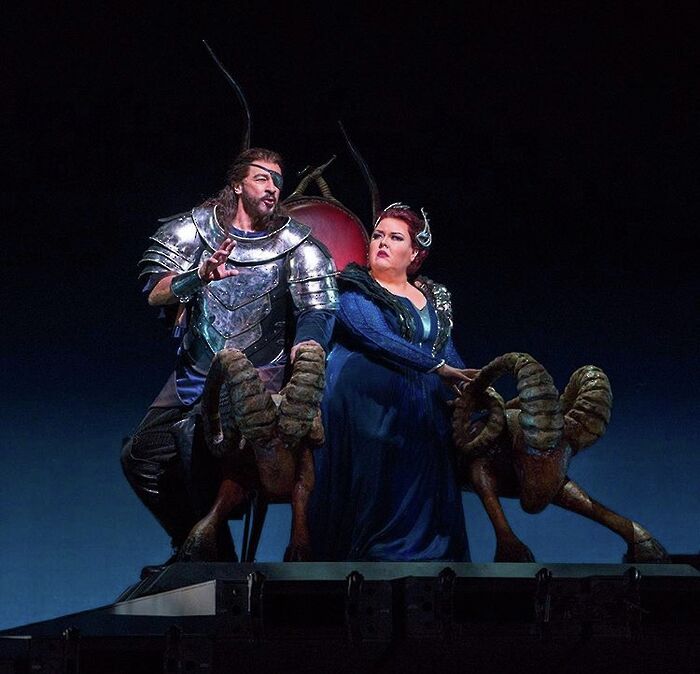Measure for Measure: Adapting Shakespeare for the #MeToo era
Odette Baber Straw discusses her experiences directing this politically relevant play in ETG’s touring 2019 production

This article contains discussion of workplace sexual misconduct.
Measure for Measure is known for being a ‘Problem Play’ – one where the audience is left unnerved by its unsatisfactory resolution. It burrows deep into the nature of power and morality, questioning what many hold as fact. These are themes which are more relevant than ever given our current social and political climate, which redefines, subverts and asserts them in radically new ways. It was this thematic relevance, and the importance and urgency which the play’s events hold, that drew me to direct it.
The #MeToo movement engendered a complete reassessment of gender relations in the workplace. Perpetrators of sexual misconduct, many of whom were in positions of power, were finally held openly accountable for their actions, in one of the most influential and ground-breaking movements of the past decade. In Measure for Measure, Angelo tells Isabella that he will only revoke her brother’s death sentence if she will sleep with him. Later, Angelo is tricked into sleeping with a woman he believes to be someone else. Both of these examples of sexual abuse belong in the movement.
It struck me that the play’s original setting, Renaissance Vienna, would not convey the gravity and urgency that a discussion of these events demands. Along with the Assistant Director, Chloe, we chose to re-set Measure for Measure in the Canary Wharf offices of the fictional investment bank Measured Investments. Here Shakespeare’s Duke, Vincentio, becomes CEO, ruling over employees rather than subjects. Behind the company’s shiny exterior, is a world of manipulation and deviance that is slowly poisoning the reputation of the company. Rumours of employees engaging in illegal behaviour have caused investors to withdraw, leaving Measured Investments teetering on bankruptcy. By restaging the show in such a way, we hope to highlight how commonplace and clandestine these abuses of power are, allowing audiences to re-engage with the source material and encouraging them to carefully reflect on their own behaviour in such environments.
More parallels between the life of the play and reality can be drawn. In Iran, Trump used his executive powers in order to kill Qasem Soleimani in an air strike. In the play, Angelo uses his authoritarian rule in order to punish his enemies disproportionately. In London, Prince Harry and Meghan Markle startled the world by withdrawing from their palatial duties, suggesting they needed ‘space’ from media scrutiny. In the play, Vincentio makes an impromptu announcement that he is taking a break from his presidential position in order to have more privacy. In a moment of irony given the theatrical setting, he says, “I love the people, but do not like to stage me to their eyes: though it do well, I do not relish well their loud applause and Aves vehement.” Power is in a state of flux where we are continually reassessing how those in power are expected to act. With this in mind, Measure for Measure seems even more politically resonant.
Given the themes of the play, it was critical for us to establish clear boundaries from the very beginning of the process to navigate these sensitive topics whilst ensuring everyone felt safe and comfortable. We were lucky enough to get on board Alice Tyrell, our fantastic Intimacy Choreographer, who helped set up a system of ‘checking in’ at the start of rehearsals and traffic lighting before any kind of physical sequence. Creating an environment where people felt able to bring up concerns seems such an obvious part of rehearsal procedure it doesn’t deserve a mention. Nonetheless it is essential to any play, let alone one that deals with such difficult topics. As welfare is increasingly being put at the forefront of student theatre, and Intimacy Directors are becoming regular features of production teams, we hope similar conversations are happening in more and more rehearsal rooms.
It has been a long journey to reach this point. When I signed on to do ETG, I did not realise how immense a task it would be. By its nature, a tour show requires compromise. A tour show for foreign language students requires that even more so. However, the company has risen to the challenge and created something truly wonderful. We have a fully working office, beautifully lit and scored to create a sense of unease and dysfunction that hangs over the play. The last time that ETG staged this show was in December 1998, but I hope that in its new setting audiences can understand that Measure for Measure’s discussion of power, coercion and morality remains hugely important.
 News / Cambridge academics sign open letter criticising research funding changes22 February 2026
News / Cambridge academics sign open letter criticising research funding changes22 February 2026 News / Student and union protesters hold ‘Trans Liberation Solidarity Rally’ 24 February 2026
News / Student and union protesters hold ‘Trans Liberation Solidarity Rally’ 24 February 2026 News / Union speakers condemn ‘hateful’ Katie Hopkins speech14 February 2026
News / Union speakers condemn ‘hateful’ Katie Hopkins speech14 February 2026 Features / Beyond the porters’ lodge: is life better outside college?24 February 2026
Features / Beyond the porters’ lodge: is life better outside college?24 February 2026 Theatre / Footlights Spring Revue? Don’t Mind if I Do!25 February 2026
Theatre / Footlights Spring Revue? Don’t Mind if I Do!25 February 2026








